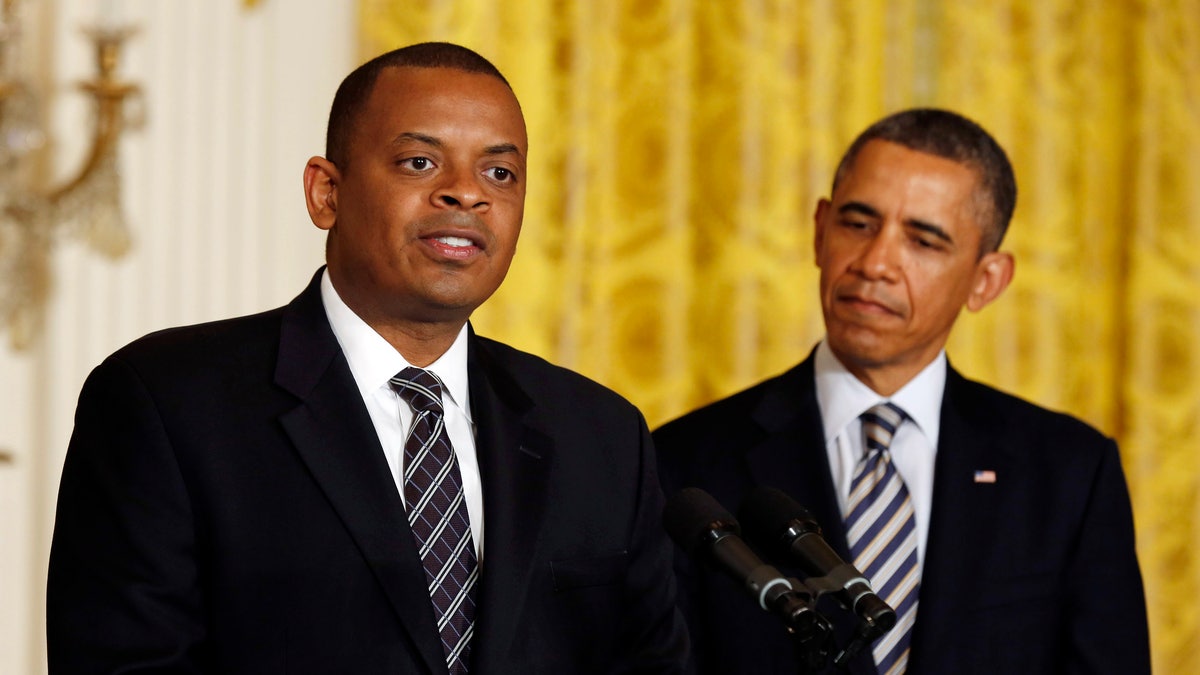
U.S. President Barack Obama listens to Charlotte, N.C., Mayor Anthony Foxx after naming him to replace Ray LaHood as U.S. Transportation Secretary in the East Room of the White House in Washington. (reuters)
The Obama administration sent a four-year, $302 billion transportation plan to Congress Tuesday, hoping to jump-start a national debate on how to repair and replace the nation's aging infrastructure while accommodating the needs of a growing population.
Action is urgently needed because the federal Highway Trust Fund is expected to run dry by late August, said Transportation Secretary Anthony Foxx. Unless Congress acts to shore up the fund, transportation aid to states will be held up and workers laid off at construction sites across the country.
Lawmakers in both parties have been reluctant to raise the 18.4 cent federal gasoline and 24.4 cent diesel taxes, the trust fund's main source of revenue. The last time they were raised was 1993. Meanwhile, two decades of inflation has driven up the cost of construction, while revenue has lagged because Americans are driving less and cars are more fuel efficient.
The administration's plan includes pumping about $150 billion into transportation programs beyond the money raised from federal gasoline and diesel taxes. The extra spending would be paid for by changes to business taxes, including a proposal to close corporate loopholes, such as ones that encourage U.S. companies to invest overseas.
"The only way we're going to fix this is if everyone puts their ideas on the table and has an honest discussion on how to find common ground," Foxx told reporters.
The bill would also encourage states to raise more money for transportation projects by loosening restrictions on tolling federal interstates. States are barred from tolling federal interstates now except if the money is used to add lanes or otherwise increase capacity, or if the highways have had tolls dating back to before the federal interstate highway program was launched in 1956. There have also been some limited pilot projects.
The plan would also raise the amount the National Highway Traffic Safety Administration can fine an automaker for safety violations from the current $35 million to $300 million. The administration has made the proposal previously, but that was before General Motors became embroiled in a scandal over delayed recalls of cars with faulty ignition switches that are believed to have led to at least 13 deaths.
President Barack Obama has emphasized infrastructure spending throughout his presidency as a means to spur job growth and increase economic competitiveness, but the bill is the first detailed, long-term transportation bill his administration has sent to Congress.
There isn't much time for Congress to act before the trust fund can no longer meet its obligations, especially in the hyper-partisan atmosphere of an election year. Many transportation insiders predict Congress will wind up doing what it has done repeatedly over the past five years — dip into the general treasury for enough money for to keep programs going a few weeks or a few months, at which point the exercise will have to be repeated all over again.
But keeping highway and transit aid constantly teetering on the edge of insolvency discourages state and local officials from moving ahead with bigger and more important projects that take many years to build. In 2012, Congress finally pieced together a series of one-time tax changes and spending cuts to programs unrelated to transportation in order to keep the trust fund solvent for about two years. Now, the money is nearly gone.




